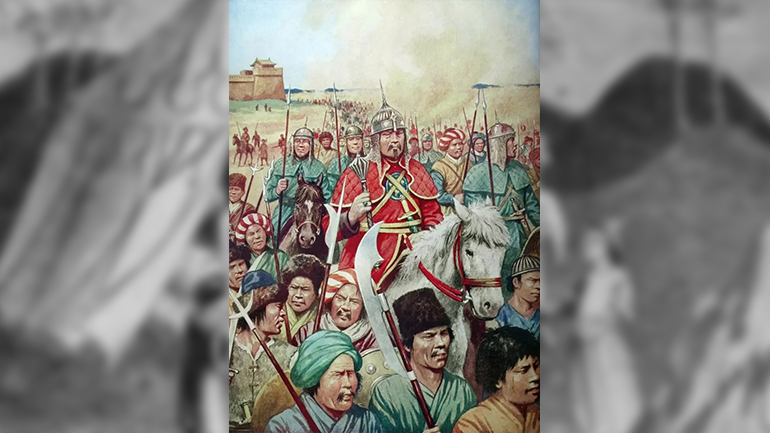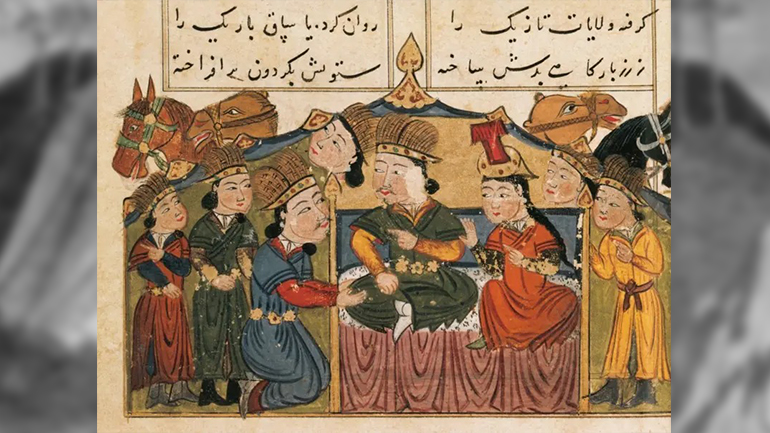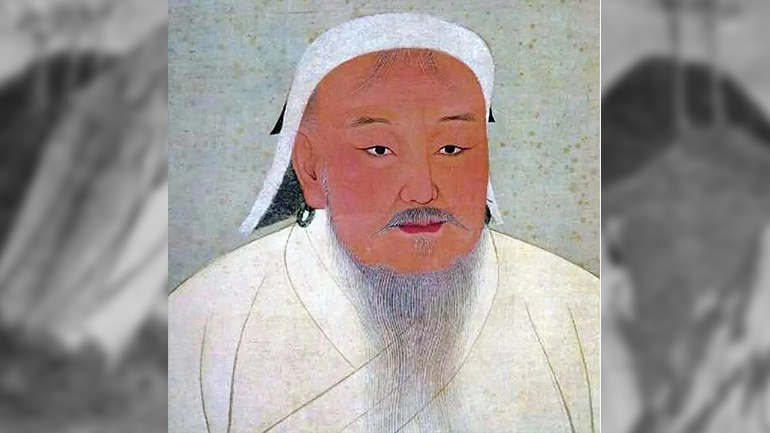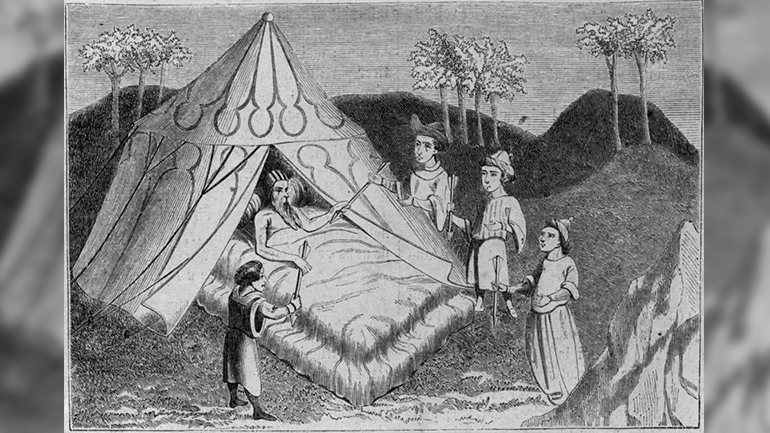

Not long after Börte married Temujin (later known as Genghis Khan), she was abducted. Erin Blakemore, in one of her articles, writes that “The abduction was revenge for the kidnapping of a woman from the Merkit tribe named Hoelun by Yesügei, the leader of the Borjigin clan.” Hoelun later became Temujin’s mother. However, Temujin rescued Börte, a battle ensued, the Merkits were defeated, and their territory was conquered. The reunion of Börte and Temujin is described in Igor de Rachewiltz’s book, The Secret History of the Mongols, as follows: “As the looting continued, Temujin moved anxiously among the fleeing crowd, calling out: ‘Börte! Börte!’” “When Börte recognized Temujin’s voice, she ran toward him. Though it was nighttime, under the moonlight, she recognized Temujin’s reins and rope and grabbed hold of them. Temujin saw her, recognized Börte, and they embraced.” This victory against the Merkits marked the beginning of Temujin’s future conquests.

Genghis Khan declared war on a rival tribe over the kidnapping of his wife.
The series of tribal conquests continued, and in the early 13th century, Temujin became known as "Genghis Khan", founding the Mongol Empire. In his book The Thirteenth Century: A World History, Richard Bressler writes that Genghis Khan largely established his stature through warfare. “He was unfamiliar with any formal philosophy. The closest expression of his ideology can be found in a quote attributed to him,” according to Stuart Legg’s book The Heartland: “The greatest happiness is to vanquish your enemies, to chase them before you, to rob them of their wealth, to see those dear to them bathed in tears, to clasp their wives and daughters to your bosom, and to savor their lips and kisses.” Genghis Khan lived by this principle throughout his life. Erin Blakemore notes that he continued his campaigns of conquest, laying waste to regions. He had many wives and hundreds of concubines, but Börte remained his first, favorite, and most influential wife. She held not only a place in his heart but also a central role in the affairs of the empire. From The Cambridge History of the Mongol Empire, edited by Michael Biran and Hodong Kim, we learn that women in Mongol society played important political, diplomatic, and even military roles. “They advised Khans, received ambassadors or went on diplomatic missions themselves, and liaised with rulers of other territories. They participated in state councils (Kurultais), where they had a voice in war strategies, policy decisions, and succession matters. While they could not be chosen as Khans, widows of Khans could exercise state authority.” Genghis Khan’s mother, Hoelun, was among the most influential women in the early Mongol Empire. After the death of Yesügei, she raised her children in poverty, providing Temujin with political insight. Still, Börte held a uniquely pivotal role in both the family and the state.

Genghis Khan on the throne with his wife
Börte was born in 1161 into the Olkhunut tribe, an ally of Temujin’s (Genghis Khan’s birth name) Borjigin clan. The two were betrothed in childhood, and their marriage took place when Börte was 17 and Temujin was 16. As part of her dowry, Börte received a fur coat made of sable. Just a few days after their wedding, the Merkit tribe raided the couple’s camp. Temujin managed to escape with his mother and six younger brothers, but his bride was left behind. The Merkits had come specifically for Börte. The backstory is that Temujin’s mother, Hoelun, was originally from the Merkit tribe, and Temujin’s father had abducted her and made her his wife. The Merkits never forgot this insult, and now they had come to abduct Börte as revenge for Hoelun’s kidnapping. Börte tried to hide in an ox cart, but the Merkits found her, tied her to a horse, and took her away. Temujin launched a tireless effort to rescue his bride. As the nomadic Merkit tribe roamed across the vast Central Asian grasslands, Temujin followed them from a distance, slowly gathering allies along the way. One of his famous quotes during this time was: “The Merkits have not just looted my tent—they have torn open my chest and stolen my heart.” Eventually, when the Merkits set up camp near Lake Baikal in Siberia, about 400 kilometers away, Temujin, with just two companions, launched a dramatic raid and rescued Börte from enemy captivity. According to some historians, this event was pivotal in Genghis Khan’s life, as it set him on the path that would eventually lead him to become a world conqueror.
According to The Cambridge History, “Börte married Temujin in 1178.” Katya Wright, in one of her articles, writes that Börte was the daughter of Dai Sechen, the chief of the Khongirat tribe. This marriage marked the beginning of Temujin’s political career. It gave him recognition through a noble lineage and allowed him to form a network of loyal allies who would accompany him on his path to power. The marriage also enabled Temujin to establish a family, which was extremely important for forming political alliances among the Mongols. As noted in The Cambridge History, “Börte advised Temujin politically and bore him nine healthy children: five daughters and four sons.” Her sons — Jochi, Chagatai, Ögedei, and Tolui — went on to rule different parts of the empire, and Ögedei was named Genghis Khan’s successor. The sons of his lesser wives were not given the same status. According to Timothy May in The Mongol Empire, only Börte’s sons were considered legitimate candidates to succeed Temujin (Genghis Khan) as Khan. The Cambridge History also reveals that Börte’s daughters — Khojin, Checheyigen, Alaqai, Tumelun, and Al Altan — were married into powerful tribes such as the Eljigin, Oirats, Onguts, Khongirat, and Uyghurs. These alliances helped expand the empire without warfare, as many neighboring states were assimilated peacefully through marriage diplomacy. Their husbands later participated in major military campaigns, including the invasion of Khwarezm (1219) and the conquests of northern China (1211–1215, 1217–1223). According to May, Börte also adopted several orphaned children, including Qutuqu Noyan and Buda Noyan, raising them as her own. This action greatly enhanced her reputation and status as a mother figure within the empire.

This series of tribal conquests continued, and in the early 13th century, Temujin became known as Genghis Khan and became the founder of the Mongol Empire.
In her book Women and the Making of the Mongol Empire, Anne Broadbridge writes that Börte’s importance would have been visible to all. Börte brought with her, as part of her dowry, a sharp and intelligent mind. She “shared responsibilities with her mother-in-law, Hoelun, including managing human resources and the camp’s economy.” As the chief wife, Börte was not only responsible for overseeing Temujin’s camp and livestock, but she also managed her resources, servants, slave girls, junior wives, and even royal guards—a number that could exceed a thousand. According to Mongol tradition, she was in charge of hosting her husband and his guests, and many major alliances and political deals were made inside her tent. She advised Temujin with sound counsel, which he took seriously, and her family actively supported Genghis Khan in both political and military affairs. She held a high status in Mongol society. Genghis Khan is known to have sought her advice on political and military matters. She fulfilled this trust with wisdom. For example, when Temujin’s close friend Jamukha, who had helped rescue Börte after her abduction, later became a political rival, Börte advised Temujin to sever ties. In 1204, Temujin defeated Jamukha and had him executed. Historian Timothy May notes that Börte also took charge of trade routes across Asia, advising officials and merchants who traveled them. According to historical records, she held considerable influence in this capacity, with multiple documented incidents proving her significance. In another instance, a close confidant of the Khan, Teb Tenggeri, insulted Temujin’s brother. Börte immediately intervened and insisted that her husband take strict action. According to Blackmore, citing historian Donna Hamil, “The Khan followed Börte’s advice, restored public order, and reinforced his leadership.” Blackmore writes that Börte served as diplomat, advisor, and administrator.

Genghis Khan and his four sons
“She not only defined the role of queen within the empire but also laid to rest rumors that her first son, Jochi, was the child of her Merkit captor and not of Genghis Khan.” “Though many aspects of Börte’s life remain hidden in history, she stands as a powerful example of how women played a vital role in the formation and governance of the empire.” Broadbridge adds, “Genghis Khan not only gained a trustworthy wife in Börte, but the empire itself required such women. Without them, the Mongol Empire might never have existed.” She remained Genghis Khan’s primary wife throughout his life. Based on childbirth timelines, it is clear she spent most of her time with him. However, even when not by his side, she administered parts of the empire independently. Broadbridge counts her among the most influential women in Genghis Khan’s life, and the stories about her strongly support this. While Genghis Khan was away on campaigns, Börte stayed in Mongolia to help manage the empire. Her lands were located along the Kherlen River. According to May, Börte died in 1230, shortly after her husband. During her lifetime, she became a deeply respected and honorable figure among the Mongol people, embodying the image of a noble mother to the entire empire—a role reinforced by her nurturing relationships with both her biological and adopted children. She not only advised her husband but also trained her daughters to become active representatives, diplomats, and contributors to state affairs. Author Max Löw, who writes on Asian topics, notes that Lake Khökh and Lake Chahan, located in present-day Mongolia, are considered sacred by Mongols. This is because Genghis Khan and Queen Börte were married there, and it became a symbol of their lifelong bond.
Powered by Froala Editor